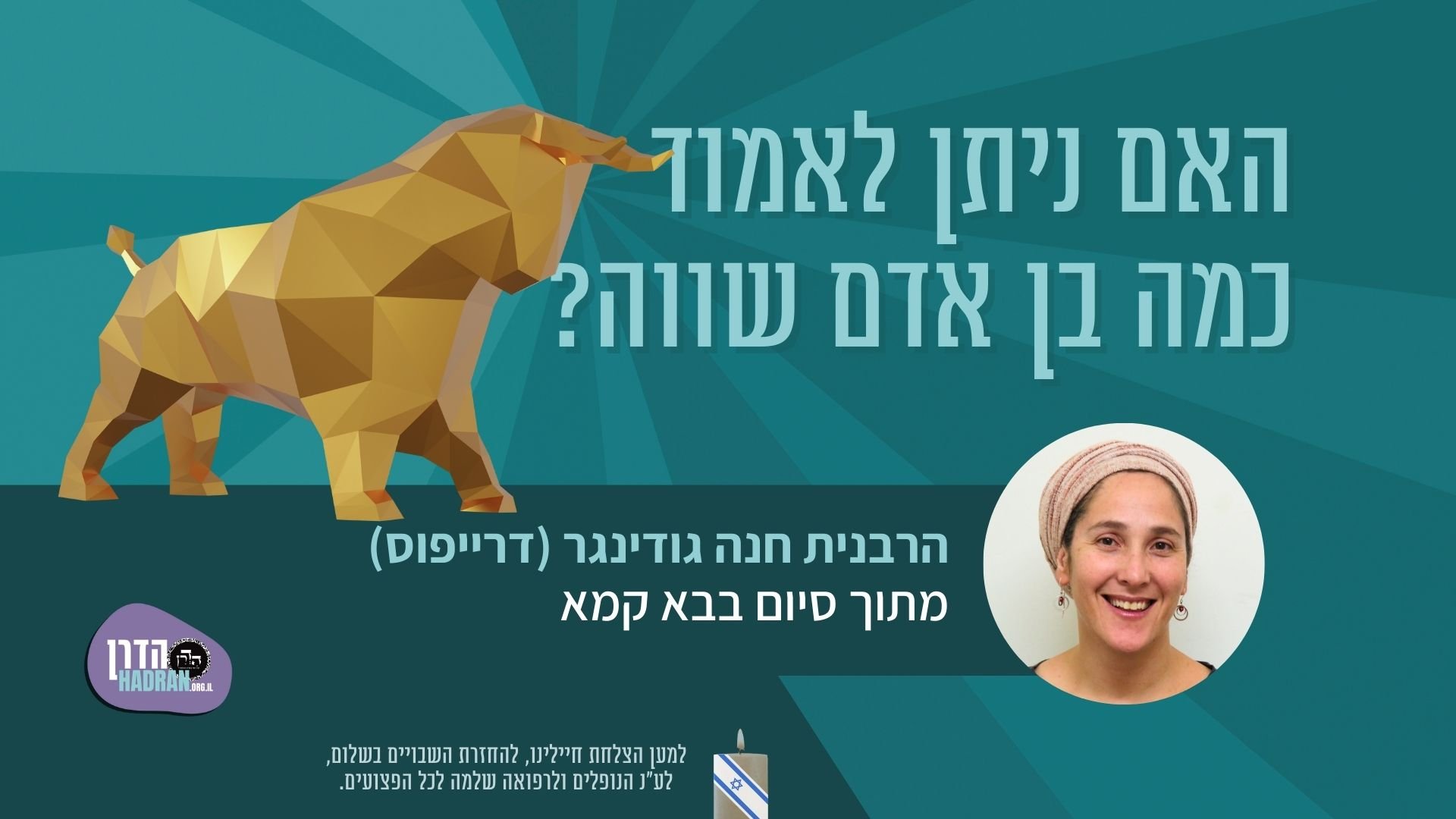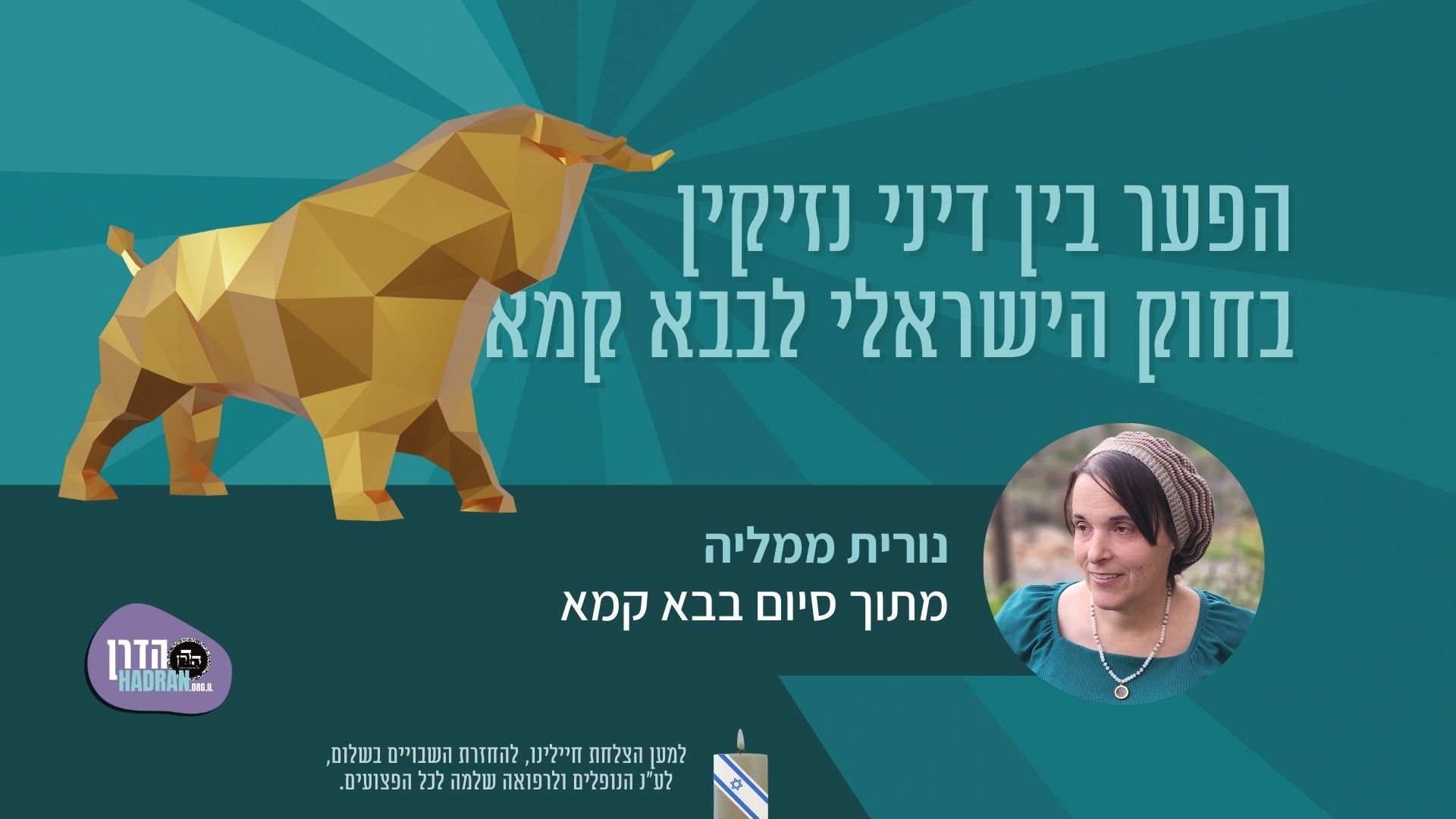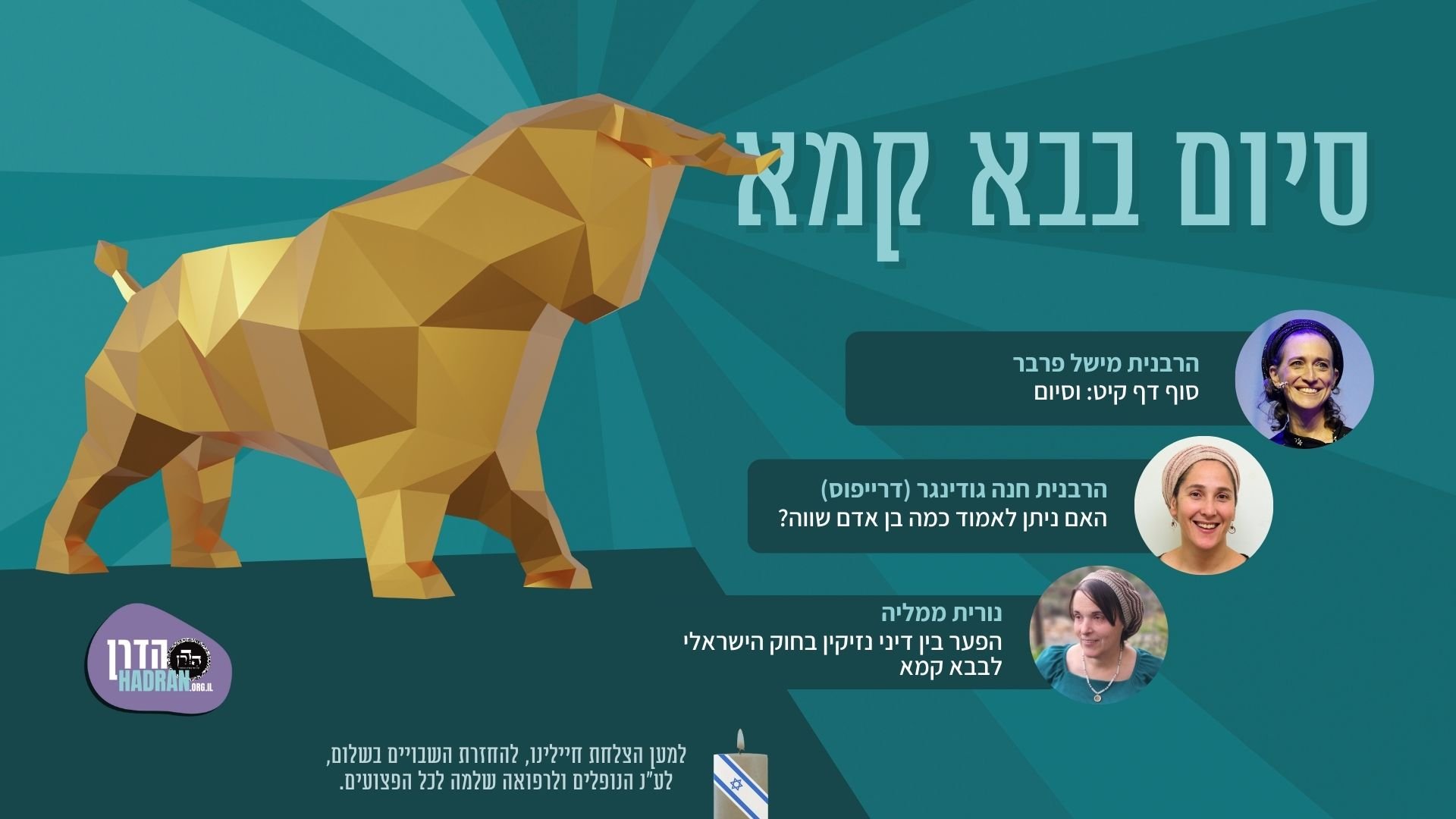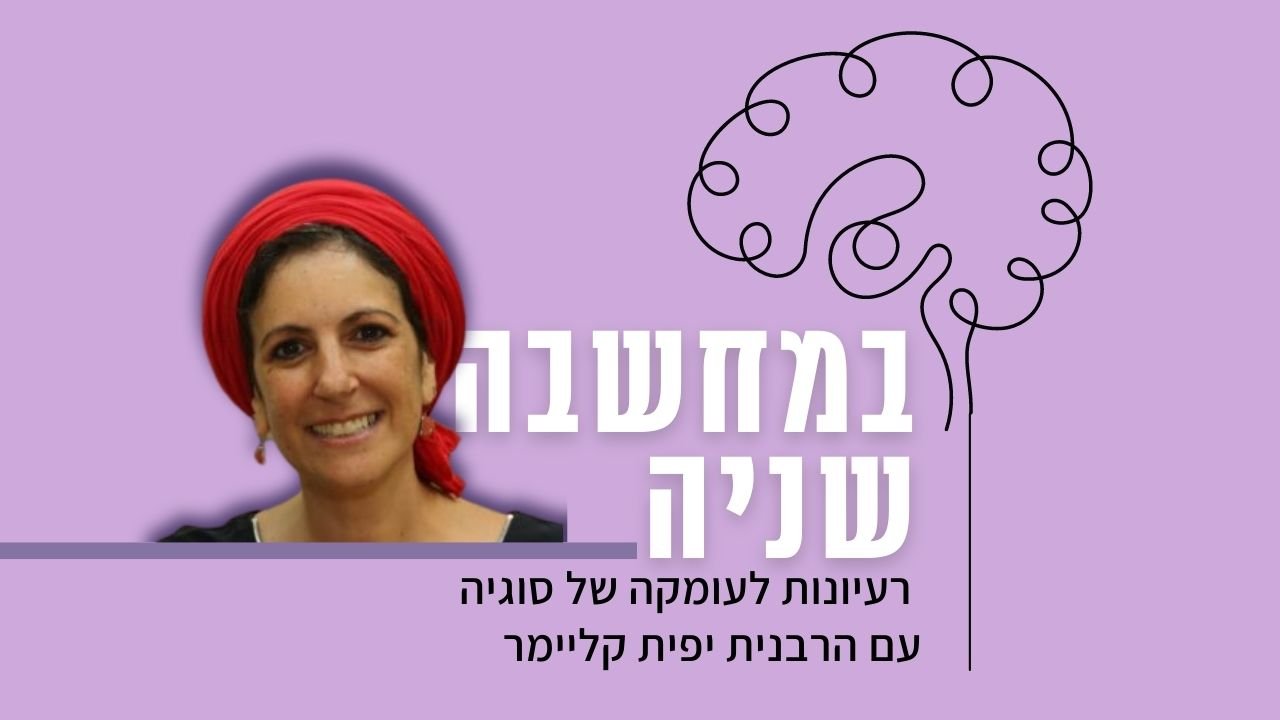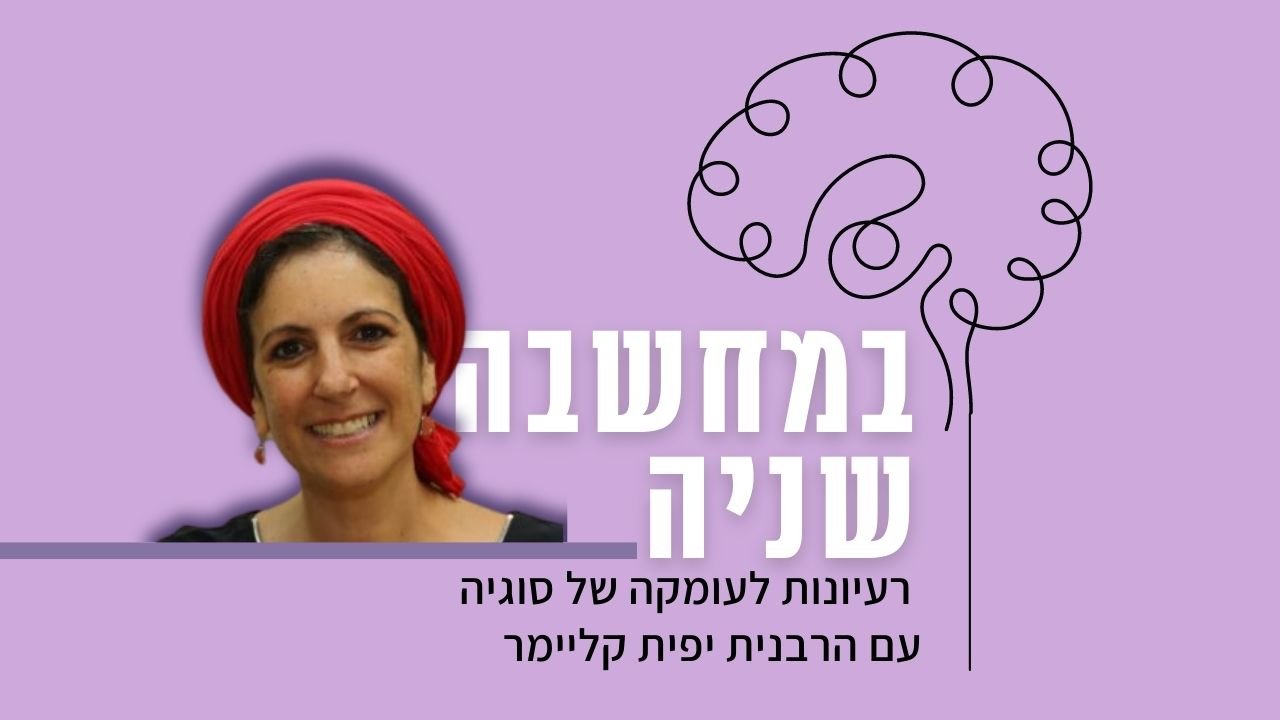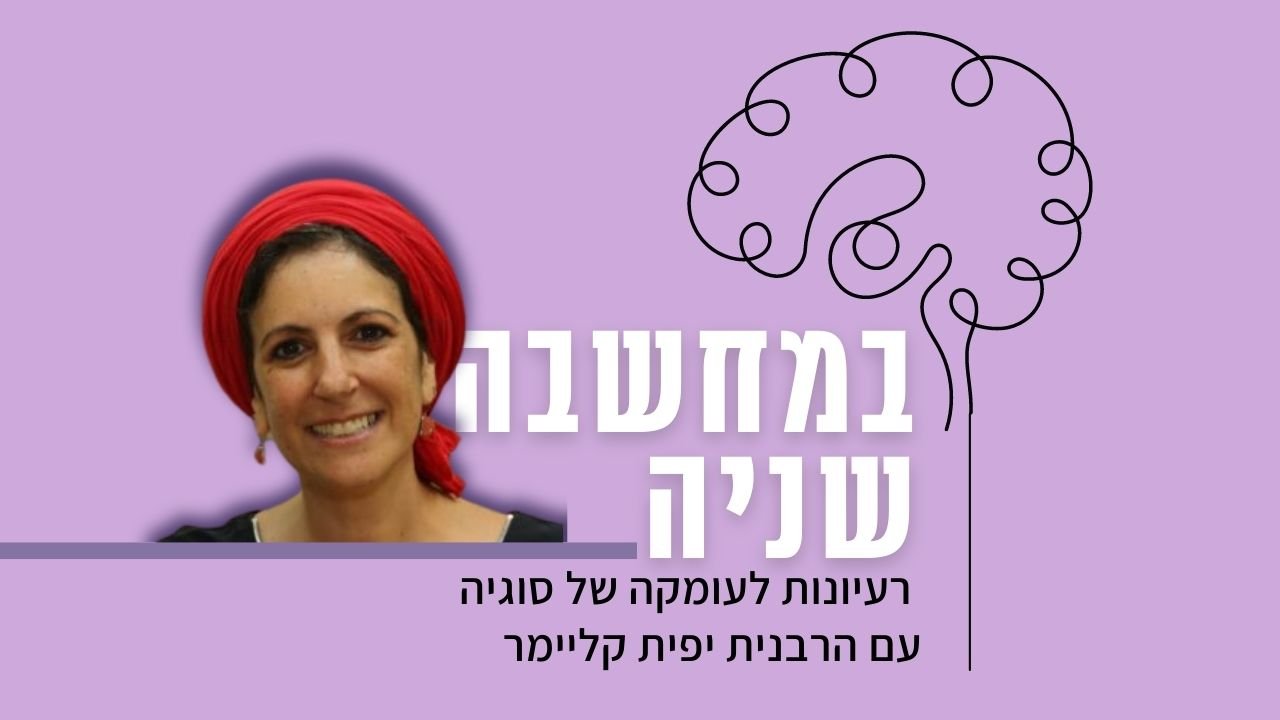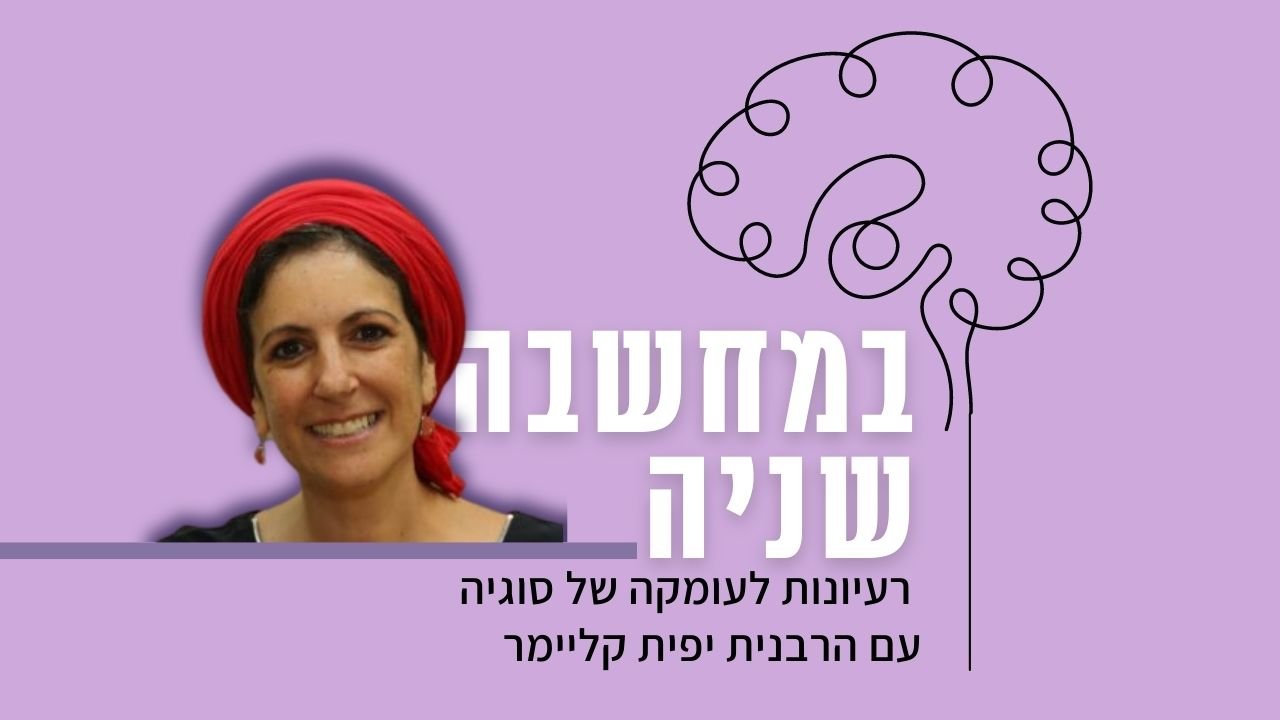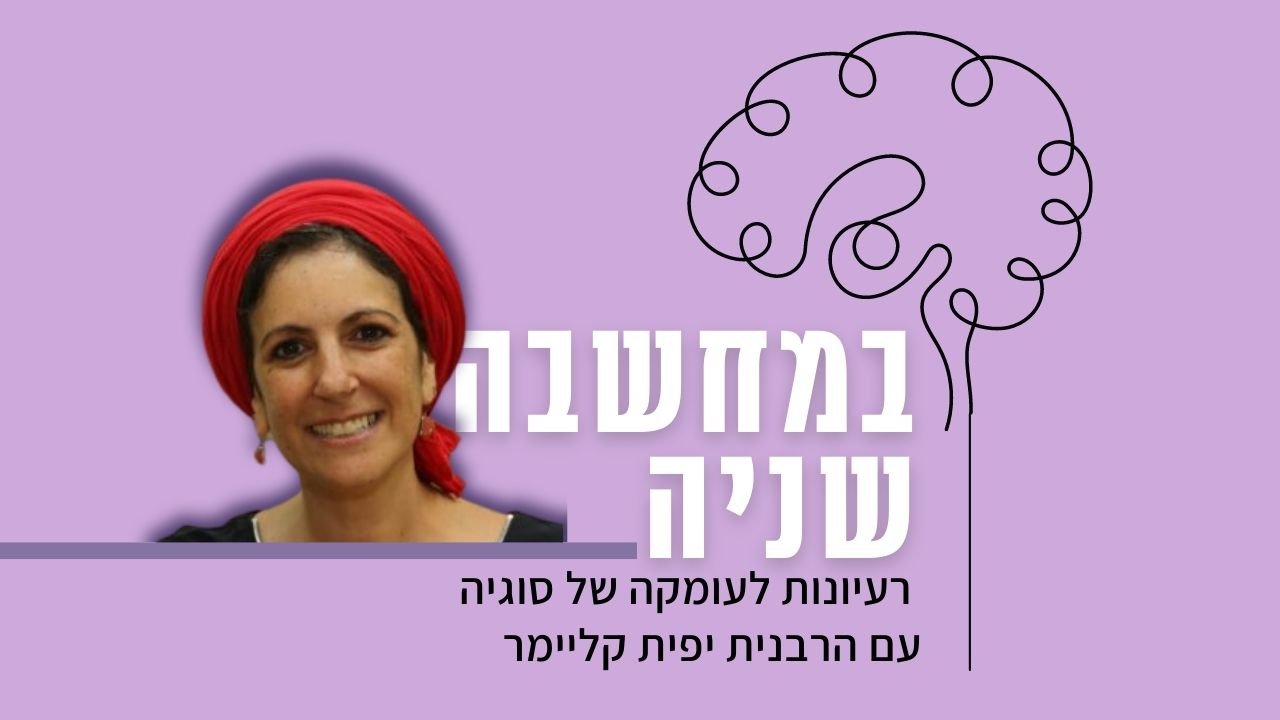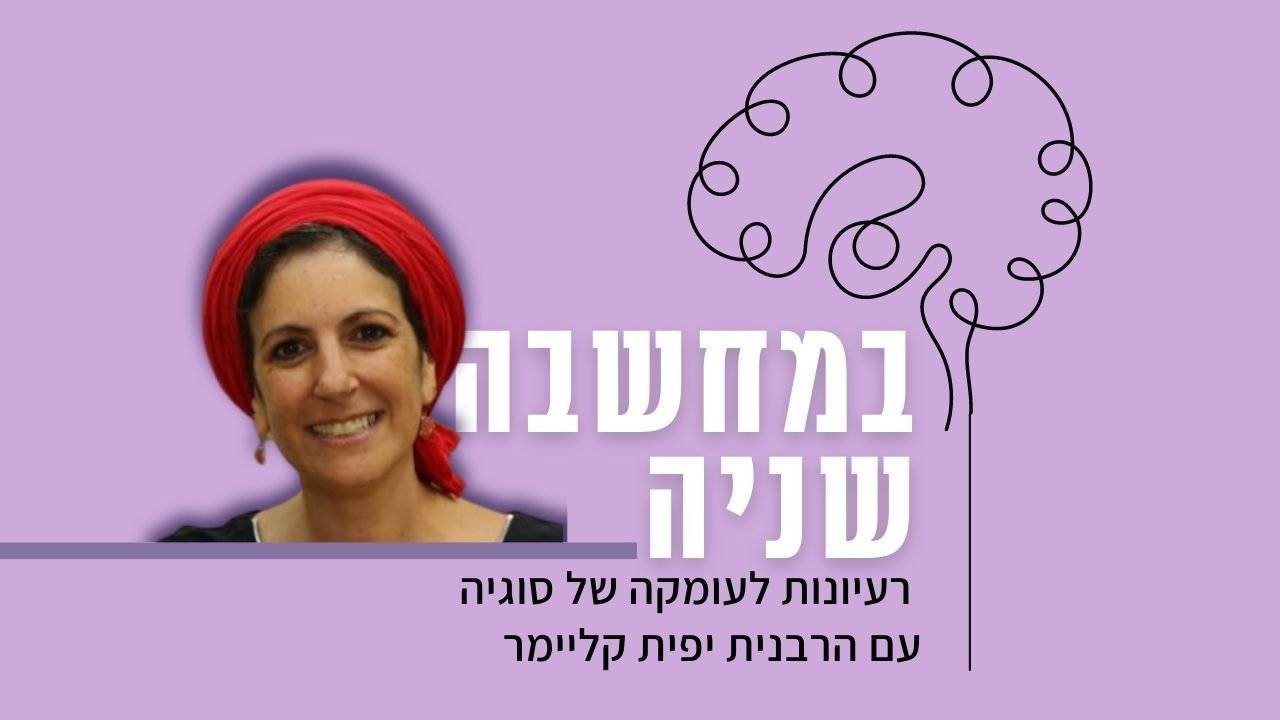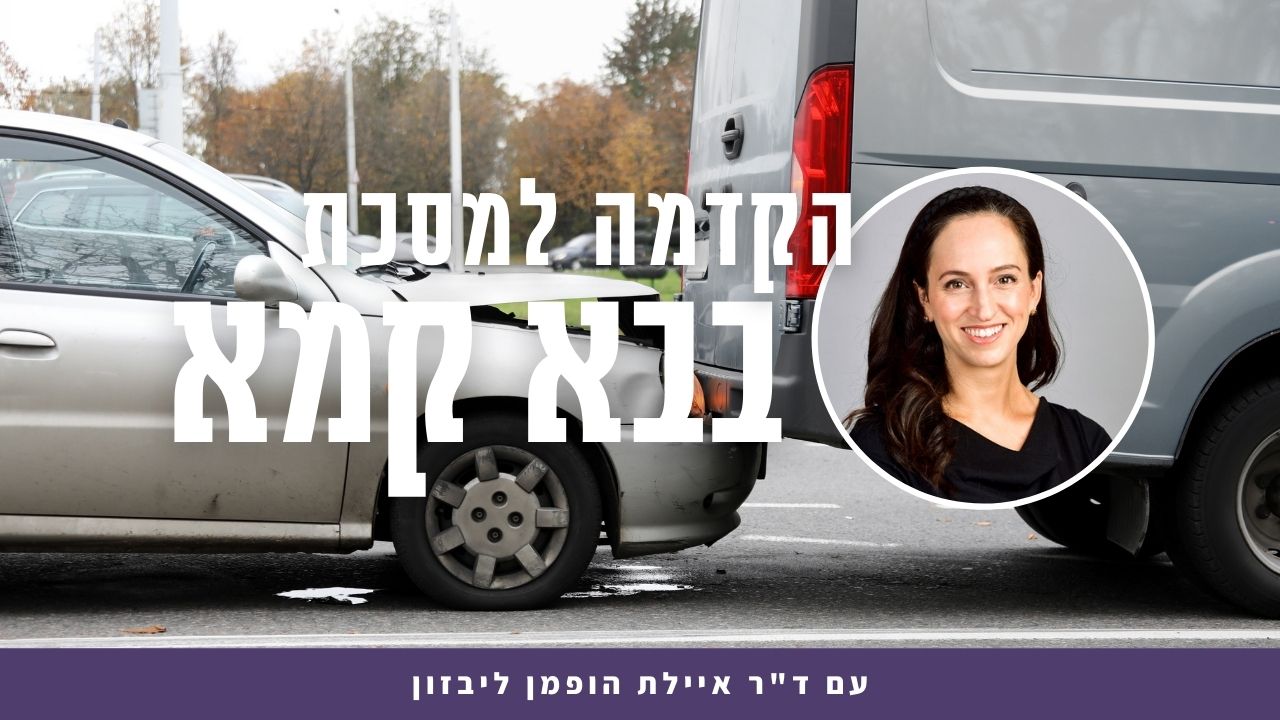רבה שואל האם ישנה חובה לשלם נזק בגין גרימת חבלה זמנית (שבסופו של דבר תתרפא לחלוטין). לרבא ולאביי יש עמדות שונות בשאלה זו. הם חלוקים גם במקרה של תשלום נזיקין לתשלום בעבור עבד עברי שכרתו ממנו אבר (שלא יתרפא) למי מגיע התשלום – לעבד או לבעלים? לפי איזו דעה תנאית (ר’ מאיר, ר’ יהודה או ר’ שמעון) סוברת המשנה כשהיא פוסקת שלגבי תשלום בושת הדבר תלוי בסטטוס הן של המבייש והן של המתבייש? מובאת ברייתא אחרת לגבי תשלום בושת, והגמרא מציעה שתי דרכים להבין אותה – לפי שיטת רבי מאיר או שיטת רבי יהודה. המשנה עוסקת במקרים שבהם מישהו גרם בושת לאדם שהיה עירום, עיוור או ישן ופוסקת שבכל המקרים הללו, יש תשלום בושת. מה הכוונה לבייש אדם עירום? רבי אבא בר ממל שואל שאלה לגבי מי שבייש אדם כשישן ומת לפני שהתעורר, האם צריך לשלם דמי בושת ליורשים? רב זביד ורב פפא מסבירים כל אחד את השאלה בצורה שונה. רבי יהודה חולק על פסיקת המשנה לגבי עיוור ופוטר מתשלום את המבייש את העיוור. הוא גם פוסק שעיוור אינו חייב לגלות לעיר מקלט אם הרג בשגגה, ואינו מקבל מלקות או מיתת בית דין. מהיכן בתורה הוא דורש הלכות אלו?
הלימוד החודש מוקדש לרפואת פיליס הכט, גיטל פעשא בת מאשה רחל על ידי חברותיה הרבות שאוהבות ומעריכות אותה.
רוצה להקדיש שיעור?

כלים
הלימוד החודש מוקדש לרפואת פיליס הכט, גיטל פעשא בת מאשה רחל על ידי חברותיה הרבות שאוהבות ומעריכות אותה.
כלים
העמקה
רוצה להבין מה באמת קורה מתחת לפני השטח של הסוגיה?
שיעורים, פודקאסטים והרחבות של מיטב המורות שלנו יפתחו לך עוד זוויות וכיווני חשיבה.
חדשה בלימוד הגמרא?
זה הדף הראשון שלך? איזו התרגשות עצומה! יש לנו בדיוק את התכנים והכלים שיעזרו לך לעשות את הצעדים הראשונים ללמידה בקצב וברמה שלך, כך תוכלי להרגיש בנוח גם בתוך הסוגיות המורכבות ומאתגרות.
פסיפס הלומדות שלנו
גלי את קהילת הלומדות שלנו, מגוון נשים, רקעים וסיפורים. כולן חלק מתנועה ומסע מרגש ועוצמתי.
בבא קמא פו
חַיָּיב בְּכוּלָּן.
is liable to pay all of the five types of indemnity.
הַאי ״לֹא עָשָׂה בּוֹ חַבּוּרָה״, הֵיכִי דָּמֵי? לָאו כְּגוֹן שֶׁהִכָּהוּ עַל יָדוֹ וְסוֹפוֹ לַחְזוֹר? וְקָתָנֵי: חַיָּיב בְּכוּלָּן!
The Gemara explains: In this case of one who injured his parent but did not bruise him, what are the circumstances? Is it not a case where he struck him on his hand, and it will eventually return to its original health? And with regard to this case that mishna teaches: He is liable to pay all of the five types of indemnity. If so, this resolves Rabba’s dilemma.
אָמְרִי: הָכָא בְּמַאי עָסְקִינַן – כְּגוֹן שֶׁחֵירְשׁוֹ, וְלֹא עָשָׂה בּוֹ חַבּוּרָה. וְהָאָמַר רַבָּה: (הַחוֹרֵשׁ) [חֵרֵשׁ] אֶת אָבִיו – נֶהֱרָג, לְפִי שֶׁאִי אֶפְשָׁר לַחֲרִישָׁה בְּלֹא חַבּוּרָה; טִיפְּתָא דִּדְמָא נְפַלָה לֵיהּ בְּאוּדְנֵיהּ!
The Sages object and say: Here we are dealing with a case where he deafened his parent by striking him, but did not bruise him. Since his father’s hearing loss is permanent, he is liable to pay all five types of indemnity, and this is not relevant to Rabba’s dilemma. The Gemara objects: But doesn’t Rabba himself say: One who deafens his father is executed, even though no bruise is visible, because it is impossible for deafening to occur without a bruise? It is certain that a drop of blood fell into his ear from the blow, even if it is not visible from the outside.
אֶלָּא הָכָא בְּמַאי עָסְקִינַן – כְּגוֹן שֶׁגִּילְּחוֹ. גִּילְּחוֹ – מִהְדָּר הָדַר, וְהַיְינוּ בַּעְיָין!
Rather, it must be that here we are dealing with a case where he shaved his father’s hair without causing a bruise. In a case where he shaved him, his hair will return, and this is an example of our dilemma, i.e., of an injury to a limb that will return to its original health. If so, this resolves Rabba’s dilemma.
אָמְרִי: הָכָא בְּמַאי עָסְקִינַן – כְּגוֹן שֶׁסָּכוֹ נָשָׁא, דְּלָא הָדַר.
The Sages object and say: It is possible that here we are dealing with a case where he smeared his father with a depilatory agent [nasha] that caused his hair to fall out, so that his hair will not return.
צַעַר – דְּאִית לֵיהּ קַרְטוּפָנֵי בְּרֵישֵׁיהּ, וְצָוַוחי [לֵיהּ] מֵהָנְהוּ קַרְטוּפָנֵי. רִיפּוּי – דְּבָעֵי אַסּוֹיֵי. שֶׁבֶת – דַּהֲוָה מְרַקֵּיד בֵּי כוּבֵּי, דְּבָעֵיא מַחְוֵי גַּוְנֵי אַרֵישֵׁיהּ; וְלָא מַחְוֵי – מֵהָנְהוּ קַרְטוּפָנֵי. בּוֹשֶׁת – אֵין לְךָ בּוֹשֶׁת גָּדוֹל מִזֶּה.
The Gemara explains how one could be liable for each of the five types of indemnity by smearing a depilatory agent: The father experiences pain in a case where he has fissures on his head and has pain from those fissures. He incurs medical costs because he requires healing for the fissures. He incurs loss of livelihood in a case where he would dance in taverns to earn money, which requires him to make various gestures with his head and his hair while dancing; and now he cannot gesture because of those fissures on his head. He experiences humiliation, because there is no humiliation greater than losing one’s hair.
וּמִילְּתָא דְּבַעְיָא לֵיהּ לְרַבָּה – פְּשִׁיטָא לֵיהּ לְאַבָּיֵי לְהָךְ גִּיסָא, וּלְרָבָא לְהָךְ גִּיסָא. דְּאִתְּמַר: הִכָּהוּ עַל יָדוֹ וְצָמְתָה, וְסוֹפָהּ לַחֲזוֹר – אַבָּיֵי אָמַר: נוֹתֵן לוֹ שֶׁבֶת גְּדוֹלָה וְשֶׁבֶת קְטַנָּה. וְרָבָא אָמַר: אֵינוֹ נוֹתֵן לוֹ אֶלָּא דְּמֵי שִׁבְתּוֹ שֶׁבְּכׇל יוֹם וָיוֹם.
The Gemara comments: And the matter that is a dilemma for Rabba is obvious to Abaye on this side of the dilemma, and to Rava on that side of the dilemma; they each resolved the dilemma but with opposing conclusions. As it was stated: If one struck another on his hand and the hand was weakened, but it will ultimately return to its original health, Abaye says: He gives him compensation for his major loss of livelihood, i.e., the decrease in his value, due to his temporary paralysis, as measured by his price on the slave market; and his minor loss of livelihood, i.e., the money he would have earned while idle during his recovery. And Rava says: He gives him only the value of his loss of livelihood for each and every day, and he does not give him the full value of his hand.
אִיתְּמַר: הַקּוֹטֵעַ יַד עֶבֶד עִבְרִי שֶׁל חֲבֵירוֹ – אַבָּיֵי אָמַר: נוֹתֵן לוֹ שֶׁבֶת גְּדוֹלָה לָעֶבֶד, וְשֶׁבֶת קְטַנָּה לָרַב. רָבָא אָמַר: הַכֹּל יִנָּתֵן לָעֶבֶד, וְיִלָּקַח בָּהֶן קַרְקַע וְהָרַב אוֹכֵל פֵּירוֹת.
§ The Gemara presents another dispute between Abaye and Rava. It was stated: With regard to one who severs the hand of a Hebrew slave who belongs to another, Abaye says: He gives compensation for the major loss of livelihood to the slave, and compensation for the minor loss of livelihood to the master. Rava says: All the compensation shall be given to the slave, and land shall be purchased with the money; and the master garners the profits from the land for the duration of the slave’s term of slavery.
פְּשִׁיטָא – פִּיחֵת אֵצֶל עַצְמוֹ, וְאֵצֶל רַבּוֹ לֹא פִּיחֵת – הֵיכִי דָּמֵי? דְּפַסְקֵיהּ לְרֵישׁ אוּנֵּיה אוֹ לְרֵישׁ נְחִירֵיהּ – הַכֹּל לְעַצְמוֹ. פִּיחֵת אֵצֶל רַבּוֹ – פְּלוּגְתָּא דְּאַבָּיֵי וְרָבָא.
The Gemara comments: It is obvious that if one injured a slave and thereby reduced the slave’s value for the slave himself, but he did not reduce the slave’s value for his master; the Gemara interjects: What are the circumstances where this is possible? This is possible in a case where he split the tip of his ear or the tip of his nostril, which does not impact the slave’s ability to perform labor. The Gemara returns to continue the statement: In such a case, all of the compensation goes to the slave himself. If the injury reduced the slave’s value for his master, then this is the case of the dispute of Abaye and Rava.
בּוֹשֶׁת – הַכֹּל לְפִי הַמְבַיֵּישׁ וְהַמִּתְבַּיֵּישׁ. מַנִּי מַתְנִיתִין? לָא רַבִּי מֵאִיר וְלָא רַבִּי יְהוּדָה, אֶלָּא רַבִּי שִׁמְעוֹן הִיא.
§ The mishna teaches: How is payment for humiliation assessed? It all depends on the stature of the one who humiliates the other and the one who is humiliated. The Gemara asks: Whose opinion is expressed in the mishna? It is not the opinion of Rabbi Meir, and it is not the opinion of Rabbi Yehuda. Rather, it is the opinion of Rabbi Shimon.
דִּתְנַן: וְכוּלָּן – רוֹאִין אוֹתָן כְּאִילּוּ הֵם בְּנֵי חוֹרִין שֶׁיָּרְדוּ מִנִּכְסֵיהֶם, שֶׁהֵן בְּנֵי אַבְרָהָם יִצְחָק וְיַעֲקֹב; דִּבְרֵי רַבִּי מֵאִיר. רַבִּי יְהוּדָה אוֹמֵר: הַגָּדוֹל לְפִי גּוֹדְלוֹ, וְהַקָּטָן לְפִי קׇטְנוֹ. רַבִּי שִׁמְעוֹן אוֹמֵר: עֲשִׁירִים – רוֹאִין אוֹתָן כְּאִילּוּ הֵם בְּנֵי חוֹרִין שֶׁיָּרְדוּ מִנִּכְסֵיהֶם, עֲנִיִּים – כִּפְחוּתִין שֶׁבָּהֶן.
These opinions are as we learned in a baraita: And in all of those cases of Jews who were humiliated, regardless of their individual stature, they are viewed as though they were freemen who lost their property and were impoverished, and their humiliation is calculated according to this status, as they are the sons of Abraham, Isaac, and Jacob, and are all of prominent lineage. Humiliation is assessed according to a standard formula, regardless of who was humiliated. This is the statement of Rabbi Meir. Rabbi Yehuda says: The court views each person according to his stature, the great person according to his greatness, and the small person according to his smallness. Rabbi Shimon says: In a case of wealthy people, the court views them as though they were freemen who lost their property; in a case of poor people, the court views them as the least among the poor. This lessens the payment of compensation for the one who caused humiliation.
מַנִּי? הַשְׁתָּא אִי רַבִּי מֵאִיר – מַתְנִיתִין קָתָנֵי: הַכֹּל לְפִי הַמְבַיֵּישׁ וְהַמִּתְבַּיֵּישׁ; וְרַבִּי מֵאִיר – כּוּלְּהוּ בַּהֲדֵי הֲדָדֵי נִינְהוּ! וְאִי רַבִּי יְהוּדָה – מַתְנִיתִין קָתָנֵי: הַמְבַיֵּישׁ אֶת הַסּוֹמֵא – חַיָּיב; וְאִילּוּ רַבִּי יְהוּדָה אוֹמֵר: סוֹמֵא אֵין לוֹ בּוֹשֶׁת! אֶלָּא לָאו רַבִּי שִׁמְעוֹן הִיא?
The Gemara explains: Whose opinion is expressed in the mishna? Now, if it is the opinion of Rabbi Meir, the mishna teaches: It all depends on the stature of the one who humiliates the other and the one who is humiliated, and Rabbi Meir holds in the baraita that all of those who were humiliated are considered alike to one another. And if it is the opinion of Rabbi Yehuda, a mishna teaches (86b): One who humiliates a blind person is liable, whereas Rabbi Yehuda says in a baraita: A blind person does not have humiliation. Rather, is the opinion expressed in the mishna not that of Rabbi Shimon?
אֲפִילּוּ תֵּימָא רַבִּי יְהוּדָה, כִּי אָמַר רַבִּי יְהוּדָה סוֹמֵא אֵין לוֹ בּוֹשֶׁת – לְמִשְׁקַל מִינֵּיהּ, אֲבָל לְמִיתְּבָא לֵיהּ – יָהֲבִינַן לֵיהּ.
The Gemara rejects this conclusion: You can even say that the mishna expresses the opinion of Rabbi Yehuda. When Rabbi Yehuda said that a blind person does not have humiliation, he meant with regard to another taking compensation for humiliation from him. A blind person is not fully aware of what he does, and one can be rendered liable for causing humiliation only if he intended to humiliate the other. But with regard to giving him compensation for humiliation, he is given compensation.
וְהָא מִדְּקָתָנֵי סֵיפָא: הַמְבַיֵּישׁ אֶת הַיָּשֵׁן – חַיָּיב, וְיָשֵׁן שֶׁבִּיֵּישׁ – פָּטוּר; וְלָא קָתָנֵי: סוֹמֵא שֶׁבִּיֵּישׁ – פָּטוּר; מִכְּלָל דְּלָא שְׁנָא הָכִי וְלָא שְׁנָא הָכִי! אֶלָּא מְחַוַּורְתָּא מַתְנִיתִין רַבִּי שִׁמְעוֹן הִיא.
The Gemara challenges this explanation of the opinion of Rabbi Yehuda: But from the fact that the latter clause of that mishna teaches that one who humiliates a sleeping person is liable but a sleeping person who humiliates another is exempt, and does not teach that a blind person who humiliates another is exempt, by inference, the mishna teaches that there is no difference this way, and no difference that way; whether a blind person humiliates another or is humiliated, the one who causes humiliation is liable to pay compensation. Rather, it is clear that the mishna is in accordance with the opinion of Rabbi Shimon.
מַאן תְּנָא לְהָא דְּתָנוּ רַבָּנַן: נִתְכַּוֵּון לְבַיֵּישׁ אֶת הַקָּטָן, וּבִיֵּישׁ אֶת הַגָּדוֹל – נוֹתֵן לַגָּדוֹל דְּמֵי בוֹשְׁתּוֹ שֶׁל קָטָן. לְבַיֵּישׁ אֶת הָעֶבֶד, וּבִיֵּישׁ אֶת בֶּן חוֹרִין – נוֹתֵן לְבֶן חוֹרִין דְּמֵי בוֹשְׁתּוֹ שֶׁל עֶבֶד. מַנִּי? לָא רַבִּי מֵאִיר, וְלָא רַבִּי יְהוּדָה, וְלָא רַבִּי שִׁמְעוֹן!
§ The Gemara analyzes a related baraita in light of the three opinions cited earlier. Who is the tanna who taught this baraita, as the Sages taught: If one intended to humiliate a small man [katan] and instead humiliated a great man [gadol], he gives the money he would have owed for the small man’s humiliation to the great man. If one intended to humiliate a slave and instead humiliated a freeman, he gives the money he would have owed for the slave’s humiliation to the freeman. Whose opinion is this? It is not the opinion of Rabbi Meir, and not the opinion of Rabbi Yehuda, and not the opinion of Rabbi Shimon.
קָא סָלְקָא דַּעְתָּךְ: קָטָן – קָטָן בִּנְכָסִים, גָּדוֹל – גָּדוֹל בִּנְכָסִים. אִי רַבִּי מֵאִיר, הָאָמַר: כּוּלְּהוּ בַּהֲדֵי הֲדָדֵי נִינְהוּ! וְאִי רַבִּי יְהוּדָה, הָאָמַר: אֵין לַעֲבָדִים בּוֹשֶׁת! וְאִי רַבִּי שִׁמְעוֹן, הָאָמַר: נִתְכַּוֵּון לְבַיֵּישׁ אֶת זֶה, וּבִיֵּישׁ אֶת זֶה – פָּטוּר!
The Gemara explains why this is not in accordance with the opinion of any of these tanna’im: It enters your mind to say that when the baraita is referring to a katan, it means that he is small in terms of his property, i.e., he is poor; and when the baraita is referring to a gadol, it means that he is great in terms of his property, i.e., he is wealthy. If this baraita is stating the opinion of Rabbi Meir, doesn’t he say in the baraita that all of those who were humiliated are considered similar to one another? And if it is stating the opinion of Rabbi Yehuda, doesn’t he say: Slaves have no humiliation; whereas the baraita discusses the compensation owed to a slave. And if it is stating the opinion of Rabbi Shimon, doesn’t he say: If one intended to humiliate this one, and instead humiliated that one, he is exempt?
מַאי טַעְמָא? כִּקְטָלָא; מָה קְטָלָא – עַד דְּמִתְכַּוֵּון לֵיהּ, דִּכְתִיב: ״וְאָרַב לוֹ וְקָם עָלָיו״ – עַד שֶׁיִּתְכַּוֵּון לוֹ; בּוֹשֶׁת נָמֵי – עַד דְּמִיכַּוֵּין לֵיהּ, דִּכְתִיב: ״וְשָׁלְחָה יָדָהּ וְהֶחֱזִיקָה בִּמְבֻשָׁיו״ – עַד שֶׁיִּתְכַּוֵּון לוֹ!
The Gemara explains Rabbi Shimon’s statement: What is the reason for exempting one who humiliated a person whom he did not intend to humiliate? The halakha of humiliation is like the halakha of killing. Just as in a case of killing, the murderer is not executed unless he intended to kill the victim specifically, as it is written: “And he lies in wait for him, and rises up against him” (Deuteronomy 19:11), which means he is not liable unless he intended to kill him specifically, so too, in a case of humiliation, the one who humiliated is not liable unless he intended to humiliate him specifically, as it is written: “And she put forth her hand, and took him by his genitals” (Deuteronomy 25:11); this teaches that one is not liable for humiliation unless he intended to humiliate him specifically.
לְעוֹלָם רַבִּי יְהוּדָה, וְכִי קָאָמַר רַבִּי יְהוּדָה: אֵין לַעֲבָדִים בּוֹשֶׁת – לְמִיתְּבָא לְהוּ; אֲבָל לְמֵישַׁם – שָׁיְימִינַן בְּהוּ.
The Gemara returns to analyzing the baraita: Actually, the baraita is in accordance with the opinion of Rabbi Yehuda, and when Rabbi Yehuda said: Slaves have no humiliation, he meant that one would not be liable to give them compensation for humiliation; but if the court needs to appraise compensation for the humiliation of others according to their humiliation, and thereby determine the compensation one owes to a freeman when he intended to humiliate a slave, then we do appraise according to their humiliation.
וְאִי בָּעֵית אֵימָא: אֲפִילּוּ תֵּימָא רַבִּי מֵאִיר, מִי סָבְרַתְּ: גָּדוֹל – גָּדוֹל בִּנְכָסִים, קָטָן – קָטָן בִּנְכָסִים? לֹא; גָּדוֹל – גָּדוֹל מַמָּשׁ, וְקָטָן – קָטָן מַמָּשׁ.
The Gemara presents an alternative explanation of the baraita: And if you wish, say instead: You can even say that the baraita is in accordance with the opinion of Rabbi Meir. Do you maintain that when the baraita is referring to a gadol, it means he is great in terms of his property, and when the baraita is referring to a katan, it means he is small in terms of his property? No, rather, when the baraita is referring to a gadol, it means an actual adult [gadol]; and when the baraita is referring to a katan, it means an actual minor [katan].
וְקָטָן בַּר בּוֹשֶׁת הוּא?! אִין; כִּדְאָמַר רַב פָּפָּא: דְּמַיכְלְמוּ לֵיהּ וּמִיכְּלַם; הָכָא נָמֵי –
The Gemara asks: But is a minor subject to humiliation? The Gemara answers: Yes, as Rav Pappa said with regard to another halakha: The case involves a minor who has reached a stage in which when others humiliate him he feels humiliation; here, too,
דְּמַיכְלְמוּ לֵיהּ וּמִיכְּלַם.
say that the baraita discusses a case involving a minor who has reached a stage in which when others humiliate him he feels humiliation.
מַתְנִי׳ הַמְבַיֵּישׁ אֶת הֶעָרוֹם, הַמְבַיֵּישׁ אֶת הַסּוֹמֵא, וְהַמְבַיֵּישׁ אֶת הַיָּשֵׁן – חַיָּיב. וְיָשֵׁן שֶׁבִּיֵּישׁ – פָּטוּר. נָפַל מִן הַגָּג, וְהִזִּיק וּבִיֵּישׁ – חַיָּיב עַל הַנֶּזֶק, וּפָטוּר עַל הַבּוֹשֶׁת עַד שֶׁיְּהֵא מִתְכַּוֵּין.
MISHNA: One who humiliates a naked person, or one who humiliates a blind person, or one who humiliates a sleeping person is liable, but a sleeping person who humiliates another is exempt. If one fell from the roof onto another person, and thereby caused him damage and humiliated him, then the one who fell is liable for the indemnity of damage, since a person is always considered forewarned, and exempt from the indemnity of humiliation, since a person is not liable for humiliation unless he intends to humiliate the other person.
גְּמָ׳ תָּנוּ רַבָּנַן: בִּיְּישׁוֹ עָרוֹם – חַיָּיב, וְאֵינוֹ דּוֹמֶה בִּיְּישׁוֹ עָרוֹם לְבִיְּישׁוֹ לָבוּשׁ. בִּיְּישׁוֹ בְּבֵית הַמֶּרְחָץ – חַיָּיב, וְאֵינוֹ דּוֹמֶה בִּיְּישׁוֹ בְּבֵית הַמֶּרְחָץ לְבִיְּישׁוֹ בַּשּׁוּק.
GEMARA: The Sages taught in a baraita (Tosefta 9:12): If one humiliated another who was naked, he is liable, but the magnitude of humiliation felt when he humiliated him while naked is not comparable to the magnitude of humiliation felt had he humiliated him while clothed, since one who chooses to be naked is less sensitive to humiliation. Similarly, if one humiliated another in a bathhouse, he is liable, but the magnitude of humiliation felt when he humiliated him in a bathhouse is not comparable to the magnitude of humiliation felt had he humiliated him in the marketplace.
אָמַר מָר: בִּיְּישׁוֹ עָרוֹם – חַיָּיב. עָרוֹם בַּר בּוֹשֶׁת הוּא?! אָמַר רַב פָּפָּא: מַאי ״עָרוֹם״ – דַּאֲתָא זִיקָא כַּרְכִינְהוּ לְמָאנֵיהּ, וַאֲתָא הוּא דַּלִּינְהוּ טְפֵי וּבַיְּישֵׁיהּ.
The Gemara clarifies the baraita: The Master says: If one humiliated another who was naked, the one who humiliated him is liable. The Gemara asks: Is a naked person subject to humiliation? Is it possible to humiliate him in this state? Rav Pappa said: What does the baraita mean when it says: Naked? It means a case where a gust of wind came and lifted his clothes, and then this one came and raised them higher and humiliated him.
בִּיְּישׁוֹ בְּבֵית הַמֶּרְחָץ – חַיָּיב. בֵּית הַמֶּרְחָץ בַּר בּוֹשֶׁת הוּא?! אָמַר רַב פָּפָּא: שֶׁבִּיְּישׁוֹ עַל גַּב הַנָּהָר.
The baraita also teaches: If one humiliated another in a bathhouse, he is liable. The Gemara asks: Is one in a bathhouse subject to humiliation? In a place where people stand naked, can a person be humiliated by having his clothes removed? Rav Pappa said: This is a case where he humiliated him not in an actual bathhouse, but on the bank of the river, which is a place where people behave more discreetly when they undress.
בָּעֵי רַבִּי אַבָּא בַּר מֶמֶל: בִּיְּישׁוֹ יָשֵׁן – וָמֵת, מַהוּ? מַאי קָמִבַּעְיָא לֵיהּ? אָמַר רַב זְבִיד, הָכִי קָמִבַּעְיָא לֵיהּ: מִשּׁוּם כִּיסּוּפָא הוּא – וְהָא מִית לֵיהּ וְלֵית לֵיהּ כִּיסּוּפָא, אוֹ דִלְמָא מִשּׁוּם זִילוּתָא הוּא – וְהָא אוֹזְלֵיהּ?
§ Rabbi Abba bar Memel raises a dilemma: If one humiliated another who was asleep, and he died before he awoke, so he never knew of his humiliation, what is the halakha? The Gemara asks: What is his dilemma? Rav Zevid said that this is his dilemma: Is the compensation for humiliation due to embarrassment, i.e., that his feelings suffer because of what he experienced, and this one died and does not have that feeling of embarrassment? Or perhaps the compensation for humiliation is due to disgrace, i.e., lessening of his honor in front of other people, and he disgraced him.
תָּא שְׁמַע, רַבִּי מֵאִיר אוֹמֵר: חֵרֵשׁ וְקָטָן – יֵשׁ לָהֶן בּוֹשֶׁת, שׁוֹטֶה – אֵין לוֹ בּוֹשֶׁת. אִי אָמְרַתְּ בִּשְׁלָמָא מִשּׁוּם זִילוּתָא, הַיְינוּ דְּקָתָנֵי קָטָן; אֶלָּא אִי אָמְרַתְּ מִשּׁוּם כִּיסּוּפָא, קָטָן בַּר בּוֹשֶׁת הוּא?!
The Gemara suggests: Come and hear a resolution to the dilemma from a baraita: Rabbi Meir says: A deaf-mute and a minor have the right to receive compensation for humiliation; an imbecile does not have the right to receive compensation for humiliation. The Gemara explains: Granted, if you say that the compensation is due to disgrace, this explanation is consistent with that which the baraita teaches concerning a minor, who can be disgraced; but if you say that the compensation is due to embarrassment, is a minor subject to humiliation?
אֶלָּא מַאי, מִשּׁוּם זִילוּתָא? אֲפִילּוּ שׁוֹטֶה נָמֵי! אָמְרִי: שׁוֹטֶה – אֵין לְךָ בּוֹשֶׁת גְּדוֹלָה מִזּוֹ.
The Gemara rejects this suggestion: Rather, what do you mean by stating that the compensation is due to disgrace? If compensation is granted due to disgrace, then an imbecile should receive compensation as well. The Sages say in response: With regard to an imbecile, you can have no greater humiliation than this. It is impossible to degrade him further.
מִכׇּל מָקוֹם נִיפְשׁוֹט מִינַּהּ דְּמִשּׁוּם זִילוּתָא הוּא, דְּאִי מִשּׁוּם כִּיסּוּפָא – קָטָן בַּר כִּיסּוּפָא הוּא? כִּדְאָמַר רַב פָּפָּא: דְּמַיכְלְמוּ לֵיהּ וּמִיכְּלַם, הָכָא נָמֵי – דְּמַיכְלְמוּ לֵיהּ וּמִיכְּלַם.
The Gemara returns to the original suggestion: In any case, resolve from this baraita that the compensation is due to disgrace, as, if it is due to embarrassment, is a minor subject to embarrassment? The Gemara rejects this proof: This is as Rav Pappa said with regard to a different halakha, cited later by the Gemara: The case involves a minor who has reached an age in which when others humiliate him he feels humiliation; here, too, say that this baraita discusses a case involving a minor who has reached an age in which when others humiliate him he feels humiliation. This is how Rav Zevid understands the dilemma of Rabbi Abba bar Memel.
רַב פָּפָּא אָמַר, הָכִי קָמִבַּעְיָא לֵיהּ: מִשּׁוּם כִּיסּוּפָא דִידֵיהּ הוּא – וְהוּא מִיית לֵיהּ, אוֹ דִלְמָא מִשּׁוּם בּוֹשֶׁת מִשְׁפָּחָה?
Rav Pappa explains Rabbi Abba bar Memel’s dilemma differently: Rav Pappa said that this is his dilemma: Is the compensation for humiliation due to his own embarrassment, and this one died and was not embarrassed? Or perhaps the compensation for humiliation is due to his family’s humiliation, and therefore the one who humiliated him must pay compensation to his family?
תָּא שְׁמַע: חֵרֵשׁ וְקָטָן יֵשׁ לוֹ בּוֹשֶׁת, שׁוֹטֶה אֵין לוֹ בּוֹשֶׁת. אִי אָמְרַתְּ בִּשְׁלָמָא מִשּׁוּם בּוֹשֶׁת מִשְׁפָּחָה – הַיְינוּ דְּקָתָנֵי קָטָן. אֶלָּא אִי אָמְרַתְּ מִשּׁוּם כִּיסּוּפָא דִידֵיהּ – קָטָן בַּר בּוֹשֶׁת הוּא?
The Gemara suggests: Come and hear a resolution from the same baraita: A deaf-mute and a minor have the right to receive compensation for humiliation; an imbecile does not have the right to receive compensation for humiliation. The Gemara explains: Granted, if you say that the compensation is due to his family’s humiliation, this explanation is consistent with that which the baraita teaches concerning a minor, whose family can experience humiliation based on what was done to their relative; but if you say that the compensation is due to his own embarrassment, is a minor subject to humiliation?
אֶלָּא מַאי? מִשּׁוּם בּוֹשֶׁת דִּבְנֵי מִשְׁפָּחָה? אֲפִילּוּ שׁוֹטֶה נָמֵי! שׁוֹטֶה – אֵין לְךָ בּוֹשֶׁת גְּדוֹלָה מִזּוֹ.
The Gemara rejects this suggestion: Rather, what do you mean by stating that the compensation is due to the humiliation of members of his family? If this is the case, an imbecile should receive compensation as well. The Sages say in response: If one is an imbecile, you can have no greater humiliation than this.
מִכׇּל מָקוֹם נִיפְשׁוֹט מִינַּהּ דְּמִשּׁוּם בּוֹשֶׁת מִשְׁפָּחָה, דְּאִי מִשּׁוּם כִּיסּוּפָא – קָטָן בַּר כִּיסּוּפָא הוּא? אָמַר רַב פָּפָּא: אִין, דְּמַיכְלְמוּ לֵיהּ וּמִיכְּלַם.
The Gemara returns to the original suggestion: In any case, resolve from this that the compensation is due to his family’s humiliation, as, if it is due to embarrassment, is a minor subject to embarrassment? Rav Pappa said: Yes, he is subject to embarrassment, as the baraita discusses a case involving a minor who has reached an age in which when others humiliate him he feels humiliation.
וְהָתַנְיָא, רַבִּי אוֹמֵר: חֵרֵשׁ – יֵשׁ לוֹ בּוֹשֶׁת. שׁוֹטֶה – אֵין לוֹ בּוֹשֶׁת. קָטָן – פְּעָמִים יֵשׁ לוֹ, פְּעָמִים אֵין לוֹ – הָא דְּמַיכְלְמוּ לֵיהּ וּמִיכְּלַם, הָא דְּמַיכְלְמוּ לֵיהּ וְלָא מִיכְּלַם.
The Gemara adds: And this distinction is taught in a baraita, as Rabbi Yehuda HaNasi says: A deaf-mute has the right to receive compensation for humiliation; an imbecile does not have the right to receive compensation for humiliation. With regard to a minor, sometimes he has the right to receive compensation for humiliation, and sometimes he does not have the right. Why is this so? This case where he has the right to receive compensation for humiliation is one involving a minor who has reached the stage in which when others humiliate him he feels humiliation; that case where he does not have the right to receive compensation for humiliation is one involving a minor who has not reached the stage in which when others humiliate him he feels humiliation.
הַמְבַיֵּישׁ אֶת הַסּוֹמֵא וְכוּ׳. מַתְנִיתִין דְּלָא כְּרַבִּי יְהוּדָה; דְּתַנְיָא, רַבִּי יְהוּדָה אוֹמֵר: סוֹמֵא – אֵין לוֹ בּוֹשֶׁת, וְכָךְ הָיָה רַבִּי יְהוּדָה פּוֹטֵר מֵחַיָּיבֵי גָלִיּוֹת, וּמֵחַיָּיבֵי מַלְקִיּוֹת, וּמֵחַיָּיבֵי מִיתוֹת בֵּית דִּין.
§ The mishna teaches: One who humiliates a blind person is liable to pay compensation. The Gemara comments: The mishna is not in accordance with the opinion of Rabbi Yehuda, as it is taught in a baraita that Rabbi Yehuda says: A blind person who humiliated another does not have liability for humiliation. And in this way Rabbi Yehuda deemed a blind person exempt from being among those liable to be exiled for killing unintentionally, and from being among those liable to receive lashes, and from being among those liable to receive court-imposed capital punishment, if he transgresses a prohibition for which the Torah mandates one of these punishments.
מַאי טַעְמָא דְּרַבִּי יְהוּדָה? גָּמַר ״עֵינֶךָ״–״עֵינֶךָ״ מֵעֵדִים זוֹמְמִין; מָה הָתָם סוֹמִין לָא, אַף הָכָא סוֹמִין לָא.
The Gemara asks: What is the reasoning of Rabbi Yehuda? He derives a verbal analogy to: “Your eye shall not pity” (Deuteronomy 25:12), stated with regard to humiliation, from: “Your eye shall not pity” (Deuteronomy 19:21), stated with regard to conspiring witnesses. The analogy teaches that just as there, with regard to the halakha of conspiring witnesses, blind people are not included, as blind people cannot see events occur in order to testify, so too here, with regard to the halakha of compensation for humiliation, blind people are not included.
מֵחַיָּיבֵי גָלִיּוֹת – דְּתַנְיָא: ״בְּלֹא רְאוֹת״ – פְּרָט לַסּוֹמֵא, דִּבְרֵי רַבִּי יְהוּדָה. רַבִּי מֵאִיר אוֹמֵר: לְרַבּוֹת אֶת הַסּוֹמֵא.
The Gemara continues its explanation: Why did Rabbi Yehuda deem a blind person exempt from being among those liable to be exiled for killing unintentionally? As it is taught in a baraita that the verse states with regard to an unintentional killing: “Or with any stone, whereby one may die, seeing him not” (Numbers 35:23), this formulation serves to exclude a blind person; this is the statement of Rabbi Yehuda. Rabbi Meir says: The verse serves to include a blind person.
מַאי טַעְמָא דְּרַבִּי יְהוּדָה? אָמַר לָךְ: ״וַאֲשֶׁר יָבֹא אֶת רֵעֵהוּ בַיַּעַר לַחְטֹב עֵצִים״ – וַאֲפִילּוּ סוֹמֵא; כְּתַב רַחֲמָנָא ״בְּלֹא רְאוֹת״ – לְמַעוֹטֵי.
The Gemara explains the dispute: What is the reasoning of Rabbi Yehuda? He would say to you: The verse states with regard to an unintentional killing, without any further limiting clause: “As when one goes into the forest with his neighbor to hew wood” (Deuteronomy 19:5), and this includes even a blind person; therefore, the Merciful One wrote in the Torah: “Seeing him not” (Numbers 35:23), to exclude a blind person.
וְרַבִּי מֵאִיר – כְּתַב רַחֲמָנָא ״בְּלֹא רְאוֹת״ לְמַעוֹטֵי, וּכְתַב רַחֲמָנָא ״בִּבְלִי דַעַת״ לְמַעוֹטֵי; הָוֵי מִיעוּט אַחַר מִיעוּט, וְאֵין מִיעוּט אַחַר מִיעוּט אֶלָּא לְרַבּוֹת.
And what is the reasoning of Rabbi Meir? The Merciful One wrote in the Torah: “Seeing him not” (Numbers 35:23), apparently to exclude one who happened to not see the one he killed; and the Merciful One wrote in the Torah: “Who kills his neighbor unawares” (Deuteronomy 19:4), apparently to exclude a blind person, who is not aware of where others are standing. This is a restriction following a restriction, and there is a hermeneutical principle that a restriction following a restriction serves only to amplify the halakha and include additional cases. Therefore, a blind person is included in the halakha of those liable to be exiled for unintentional killing.
וְרַבִּי יְהוּדָה – הָהוּא ״בִּבְלִי דַעַת״, פְּרָט לְמִתְכַּוֵּין הוּא דַּאֲתָא.
The Gemara asks: And what would Rabbi Yehuda respond to this reasoning? The Gemara explains: That verse: “Who kills his neighbor unawares,” does not exclude one who could not see, but rather, it comes to exclude one who was intending to kill a particular person and unintentionally killed someone else. That killer is not exiled.
חַיָּיבֵי מִיתוֹת בֵּית דִּין – אָתְיָא ״רֹצֵחַ״–״רֹצֵחַ״ מֵחַיָּיבֵי גָלִיּוֹת.
The Gemara continues to explain the opinion of Rabbi Yehuda. Why did he deem a blind person exempt from being among those liable to receive court-imposed capital punishment? That halakha is derived by means of a verbal analogy to: “But if he smote him with an instrument of iron so that he died, he is a killer; the killer shall be put to death” (Numbers 35:16), written with regard to capital punishment, from: “You shall appoint for yourselves cities, to be cities of refuge for you, that a killer who killed any person unintentionally may flee there” (Numbers 35:11), written with regard to those liable to be exiled.
חַיָּיבֵי מַלְקִיּוֹת – אָתְיָא ״רָשָׁע״–״רָשָׁע״ מֵחַיָּיבֵי מִיתוֹת בֵּית דִּין.
Why did Rabbi Yehuda deem a blind person exempt from being among those liable to receive lashes? That halakha is derived by means of a verbal analogy to: “Then it shall be, if the guilty one deserves to be beaten” (Deuteronomy 25:2), written with regard to lashes, from: “Moreover you shall take no ransom for the life of a murderer, that is guilty of death” (Numbers 35:31), written with regard to those liable to receive court-imposed capital punishment.
תַּנְיָא אִידַּךְ, רַבִּי יְהוּדָה אוֹמֵר: סוֹמֵא אֵין לוֹ בּוֹשֶׁת.
The Gemara presents another statement of Rabbi Yehuda: It is taught in another baraita that Rabbi Yehuda says: A blind person does not have humiliation,
